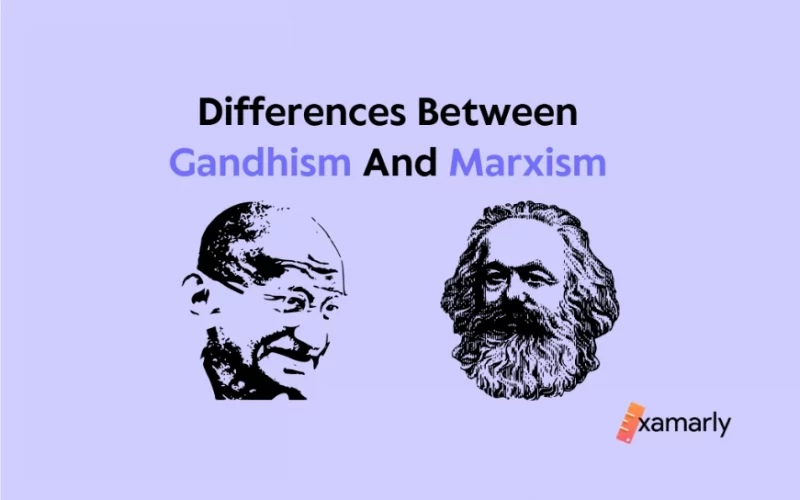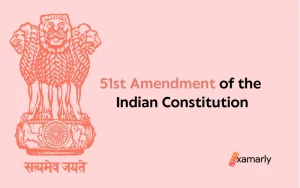The two ideologies have left a lasting impact on countries across the world. Both ideologies have shaped the political landscape, but they have distinct differences in their approach to justice, equality, and nonviolence. Their ideologies may seem similar at first glance, but upon closer examination, there are clear differences between the two ideologies.
From both the philosophers’ beliefs about power and oppression to their strategies for social change, learn about the differences between Gandhism and Marxism in this article.
- Differences Between Gandhism and Marxism: What is Gandhism?
- Conception of Ideal State
- Capitalism
- Spiritualism vs. Materialism
- Ends and Means
- Class War
- Investment of Capital
- Democracy vs. Dictatorship
- Differences Between Gandhism and Marxism: What is Marxism?
- Conception of Ideal State
- Capitalism
- Spiritualism vs. Materialism
- Ends and Means
- Class War
- Investment of Capital
- Democracy vs. Dictatorship
- Differences Between Marxism and Gandhism
- Summary
- FAQs on Differences Between Marxism and Gandhism
Differences Between Gandhism and Marxism: What is Gandhism?
Gandhism is a political and social philosophy that focuses on nonviolence, truth, and compassion as the means of achieving political and social change. It is based on the teachings and practices of Mohandas Karamchand Gandhi, an Indian independence activist who lived from 1869 to 1948.
At its core, Gandhism emphasizes the power of nonviolence as a means of resistance and change. Gandhi’s philosophy of satyagraha, or nonviolent resistance, was instrumental in India’s independence movement and has inspired activism and resistance movements around the world.
The central principle of ahimsa, or nonviolence, extends beyond just physical violence, but also encompasses refraining from harming others through thoughts and actions.
Gandhism also prioritizes self-reliance and self-rule, as embodied in the concept of swaraj. This involves individuals and communities taking responsibility for their own lives and decisions, rather than relying on external authority. This idea is closely tied to Gandhi’s beliefs in the importance of rural development and education, which he saw as a way to empower people and communities.
In addition to these political and social principles, Gandhism is also deeply rooted in spiritual values such as compassion, honesty, and humility. Gandhi saw these values as essential to creating a just and equitable society, and as key components of individual and collective self-improvement.
Overall, Gandhism remains a powerful and influential philosophy today, particularly in the fields of peace and human rights activism. Its principles of nonviolence, self-reliance, and compassion continue to inspire people & politics around the world to work towards a more just and equitable society.
Conception of Ideal State
Under Gandhism, the conception of an ideal state is decentralized, with self-sufficient, empowered and harmonious villages forming the cornerstone of the political structure, where people have control over their own lives and resources.
The state’s role is limited to providing protection and resolving disputes. The state should promote non-violence, equality, and justice, and serve as a model of moral behavior. Hence, gandhism promotes a stateless society.
Capitalism
Under Gandhism, capitalism is viewed as a materialistic and exploitative economic factor/system, which places profit over people and perpetuates inequalities in countries. Gandhi instead promoted the principles of economic self-sufficiency, decentralization, and trust in local communities, which he referred to as “trusteeship.”
This involves the wealthy using their resources for the benefit of society, rather than solely for their own gain. Gandhi had firm faith that true wealth is measured by spiritual and moral values, not by material possessions.
You Might Also Like To Read: Difference Between Capitalist and Socialist Economy.
Spiritualism vs. Materialism
Under Gandhism, spiritualism is prioritized over materialism. Gandhi believed that material possessions and worldly success were not the ultimate goals in life, but rather means to serve others and promote the greater good.
He promoted the idea of self-sufficiency and non-attachment to material things, and emphasized the importance of inner development, self-realization and the pursuit of truth and justice. Gandhi believed that true wealth lies in one’s spiritual and moral values, not in material possessions. In contrast, materialism is seen as a source of greed, exploitation, and social and economic inequalities.
Ends and Means
Gandhism emphasizes the importance of ends and means being morally consistent. Gandhi believed that the ends (goals or objectives) can only be considered truly valuable if the means (actions or methods) used to achieve those ends are themselves moral and just.
In other words, the means should not be unethical or unjust, even if the ends are desirable. This is known as the principle of “means justify the ends”. Gandhi’s approach was to always seek nonviolent and ethical solutions to conflicts, and to reject violence or unjust means as a means of achieving an end.
Class War
Gandhi was against the idea of class war or violence as a means of achieving social and economic justice. He believed that violence and injustice, even if used in the service of a noble cause, would only lead to more violence and suffering.
Instead, Gandhi advocated for nonviolent resistance and civil disobedience as the means to bring about social change and individual liberty. He believed that the power of love, truth, and nonviolence could be used to peacefully confront oppressive systems and bring about justice and equality.
According to Gandhi, the ultimate goal of class struggle should be to uplift the oppressed and to create a society in which everyone has equal opportunities and is treated with dignity and respect.
Investment of Capital
In Gandhian philosophy, the investment of capital should prioritize ethical and moral considerations over solely financial ones. Gandhi believed that the primary purpose of capital and wealth was to serve the needs of humanity and to create a more just and equitable society. He advocated for the development of small-scale, decentralized economic systems that put people and communities first, rather than corporations and large-scale industry.
Gandhi also believed in the principle of trusteeship, where those who have wealth and resources should consider themselves trustees of those resources and use them for the benefit of society as a whole. This approach prioritizes the welfare of people over the accumulation of wealth, and encourages the use of capital to serve the greater good.
Democracy vs. Dictatorship
In a democracy, power is held by the people and exercised through elected representatives, while in a dictatorship, power is held by a single individual or group who exercises control over the government and people without their consent.
Under Gandhism, democracy is seen as a preferred form of government as it aligns with the principles of non-violence, equality, and popular sovereignty. A dictatorship, on the other hand, goes against these principles as it involves the use of force and oppression to maintain control.
Gandhi himself was a strong advocate of democratic values and believed in empowering the masses through education and active participation in the political process. He also believed that people have the capacity for self-governance and that democracy is necessary for the full development of human potential.
Differences Between Gandhism and Marxism: What is Marxism?
Marxism is a social, political, and economic theory originated by Karl Marx, which focuses on the struggle between capitalists and the working class.
According to Marxism, capitalism leads to exploitation of the working class, as capitalists extract surplus value from their labor. This exploitation creates class conflict and will ultimately lead to a revolution in which the working class overthrows the capitalist system, establishing a socialist society in which the means of production are collectively owned.
Marxism is a comprehensive ideology that critiques capitalism and advocates for a socialist society. In a socialist society, the state plans and manages the economy, working towards the goal of meeting the needs of all citizens and creating an equal distribution of wealth. It is based on the idea that human history is defined by class struggle and that the exploitation of one class by another is a central feature of society under capitalism.
In Marxist theory, the ruling class (the bourgeoisie) exploits the working class (the proletariat) by paying them less than the value of their labor, thereby creating surplus value for the capitalists. Marx believed that this exploitation/derogatory politics would inevitably lead to a revolution, in which the working class would overthrow the capitalist class and establish a socialist society.
In this new society, the means of production would be owned collectively and controlled democratically, rather than by a small group of individuals. This would allow for a more equal distribution of wealth and resources, as well as greater freedom and equality for the working class. Marxist theory also critiques other forms of oppression, such as racism and sexism, as they are seen as complementary to the exploitation of the working class.
You Might Also Like To Read: Socialist Meaning In Indian Constitution.
Conception of Ideal State
Under Marxism, the ideal state is one where the means of production are collectively owned and controlled by the working class. This socialist state is intended to serve the interests of the working class and to ensure a more equal distribution of wealth and resources.
In this state, decision-making power is held by the workers themselves through democratic processes, rather than being controlled by a small group of capitalists. Marxism doesn’t promote a stateless society as compared to Gandhism.
In the Marxist view, the state acts as a mediator between classes and helps to abolish exploitation and oppression. The state acts to facilitate the transition from capitalism to socialism and to ensure that the interests of the working class are protected. It acts as a tool for the working class to build a new society based on the principles of equality and justice.
The state also plays a role in planning and managing the economy, working towards the goal of meeting the needs of all citizens.
The ultimate goal of the socialist state is to create a classless society, in which individuals are not defined by their economic status, but are free to develop their full potential. In this society, exploitation and oppression would be abolished, and the means of production would be controlled democratically for the benefit of all.
Capitalism
Under Marxism, capitalism is seen as an economic system based on the private ownership of the means of production and the exploitation of the working class.
In capitalism, the ruling class (the bourgeoisie) own the factories, land, and other means of production and use the labor of the working class (the proletariat) to produce goods and services. The workers are paid a wage that is less than the value of their labor, and the difference between the value of their labor and the wage they receive is the source of profit for the capitalists.
Marx saw capitalism as a dynamic and exploitative system that constantly creates and expands the working class, and creates an ever-growing wealth gap between the capitalists and the workers. He believed that the struggle between the capitalists and the workers would ultimately lead to a revolution, in which the working class would overthrow the capitalist class and establish a socialist society.
Marx also believed that capitalism had a number of contradictions, such as the tendency for overproduction and the falling rate of profit, which would ultimately lead to its collapse. He saw capitalism as a necessary but transitory stage in human history, paving the way for the eventual establishment of a socialist society based on the principles of equality and justice.
You Might Also Like To Read: Difference Between Capitalism And Socialism.
Spiritualism vs. Materialism
In Marxist theory, spiritualism and materialism refer to two different philosophical perspectives on the nature of reality and human existence.
Materialism is the central principle of Marxist philosophy and is concerned with the material conditions of life and the physical basis of human existence. It views human history as being driven by changes in the mode of production, and sees social and cultural phenomena as being shaped by economic and technological developments.
Spiritualism, on the other hand, is a philosophical perspective that emphasizes the spiritual or non-physical aspects of human existence, such as religion, morality, and culture. Marx saw spiritualism as a way for the ruling class to justify their power and oppress the working class. He believed that the ruling class used religion and other spiritual ideologies to distract the workers from their true interests and maintain control over them.
Under Marxism, materialism is seen as the more scientific and accurate view of human existence, as it is based on the objective conditions of life and the objective laws of history. Spiritualism is seen as a way of obscuring reality and perpetuating exploitation and oppression.
Ends and Means
In Marxist theory, the relationship between ends and means is a central principle in understanding the dynamics of social change and revolution.
Ends refers to the ultimate goal or objective of a particular political or social movement. For Marxists, the end goal is the establishment of a socialist society based on the principles of equality and justice.
Means, on the other hand, refers to the methods or tactics used to achieve the end goal. Marxists believe that the means used to achieve a goal must be consistent with the goal itself. For example, the means used to achieve a socialist society must be democratic, participatory, and grounded in the principles of equality and justice.
The relationship between ends and means is important because the means used to achieve a goal can shape the outcome. If the means used to achieve a socialist society are violent or oppressive, for example, the end result may not be a society based on equality and justice.
Class War
Class war, also known as the class struggle, is a central concept in Marxist theory. It refers to the conflict between the ruling class (the bourgeoisie) and the working class (the proletariat) over the control of the means of production and the distribution of wealth.
Marx saw class war as an inevitable aspect of capitalist society, as the interests of the ruling class and the working class are inherently opposed. The ruling class uses its control over the means of production to exploit the working class and maintain its power, while the working class struggles to improve its living and working conditions and to secure its rights.
The class struggle is seen as the driving force behind historical change, as the working class eventually gains the power to overthrow the ruling class and establish a socialist society. Marx believed that the class struggle would ultimately lead to a revolution, in which the working class would seize the means of production and establish a socialist state.
Class war under Marxism is not just a physical conflict, but also a struggle over ideas, culture, and values. The ruling class uses its control over the media, education, and other cultural institutions to maintain its power, while the working class struggles to develop its own culture and consciousness.
Investment of Capital
In Marxist theory, the investment of capital refers to the use of money to purchase or produce goods with the aim of making a profit. Under capitalism, capital is invested in the production of goods and services, with the expectation that the sale of these goods and services will generate a profit.
Marx saw the investment of capital as a key feature of the capitalist system and a source of exploitation and oppression. He argued that the capitalists use their control over the means of production to extract surplus value from the working class, which is the difference between the value of what the workers produce and the wages they receive.
The investment of capital is also seen as a source of economic instability and crisis, as the drive for profits can lead to overproduction, declining profits, and unemployment. Marx argued that the capitalist system is inherently unstable and prone to periodic crises, as the capitalists are constantly seeking new markets and new sources of profit.
Democracy vs. Dictatorship
In Marxist theory, the relationship between democracy and dictatorship is a complex and controversial issue.
On one hand, Marxists view democracy as a form of political organization that can be used to advance the interests of the working class and to create a more just and equal society. They believe that a democratic system of government can provide the working class with a voice in the political process and help to ensure that the needs and interests of the majority are taken into account.
On the other hand, Marxists also believe that the existing capitalist system of democracy is fundamentally flawed and dominated by the ruling class. They view it as a form of dictatorship of the bourgeoisie, in which the ruling class uses its control over the media, education, and other cultural institutions to maintain its power and to manipulate public opinion.
In the Marxist view, the dictatorship of the proletariat is seen as a necessary stage in the transition to a socialist society. The dictatorship of the proletariat refers to a period in which the working class takes control of the state and uses its power to abolish the capitalist system and to establish a socialist state.
During this period, the working class would be the dominant political force and the state would have the power to take decisive action to abolish capitalism and establish socialism.
You Might Also Like To Read: Difference Between Socialism and Democracy.
Differences Between Marxism and Gandhism
| Key Concept | Marxism | Gandhism |
|---|---|---|
| Economic System | Socialism. | Decentralized economy. |
| Means of Change | Revolution. | Nonviolent resistance. |
| Concept of Property | Abolition of private property. | Limited private property. |
| Role of State | Proletarian dictatorship. | Minimal state involvement. |
| Concept of Class | Class struggle. | Emphasizes individual responsibility. |
| Ideology | Materialism. | Spiritualism. |
| Political System | Dictatorship of the proletariat. | Democratic. |
| Concept of Power | Power through force. | Power through moral influence. |
| View on violence | Justifiable for revolutionary purposes. | Nonviolence is central. |
| Approach to Social Change | Structural change. | Gradual change through individual transformation. |
| Solution to Oppression | Abolition of capitalist system. | Transformation of individual attitudes and behavior. |
| View on Capitalism | Capitalism is oppressive. | Capitalism is flawed but can be reformed. |
| Approach to Economy | Centralized control. | Decentralized and self-sufficient local economies. |
| View on Wealth | Wealth should be distributed equally. | Wealth is secondary to inner spiritual wealth. |
| Concept of Freedom | Political and economic freedom. | Inner spiritual freedom. |
| View on Religion | Religion is a tool of oppression. | Religion is a personal spiritual practice. |
| View on Individual | Collective good is priority. | Individual transformation leads to social change. |
| Concept of Human Nature | Human nature can be changed through revolution. | Human nature can be transformed through moral development. |
| View on Authority | Authority is oppressive. | Authority should be based on moral influence. |
| Concept of Progress | Progress through revolution. | Progress through individual transformation. |
| View on Human Relationships | Class struggle between oppressor and oppressed. | Nonviolent cooperation and mutual respect. |
| Concept of Justice | Structural change to eliminate oppression. | Justice through individual transformation and nonviolence. |
| Approach to Conflict | Conflict resolution through revolutionary change. | Conflict resolution through nonviolence and reconciliation. |
| View on War | Justifiable for revolutionary purposes. | War is always unjustifiable. |
| Concept of Patriotism | Internationalism. | Love for all humanity. |
Summary
In summary, Gandhism supports democracy over dictatorship as it aligns with its principles and values of non-violence, truth, equality, and compassion while Marxism offers a critique of capitalism and a vision for a more equitable and just society.
Related Articles:
FAQs on Differences Between Marxism and Gandhism
What is the Communist Manifesto?
The Communist Manifesto is a political pamphlet written by Karl Marx and Friedrich Engels in 1848.
Where did Marxism and Gandhism originate from?
Marxism was developed by Karl Marx and originated in Europe in the 19th century, while Gandhism originated in India and was developed by Mahatma Gandhi.
What should be the role of the state according to Marxism and Gandhism?
Marxists believe in the abolition of private property and the establishment of a central state to control the means of production. Gandhists believe in the decentralization of power and a limited role for government.
What is the main difference between Gandhism and Marxism?
The main difference between Gandhism and Marxism is their approach to change and the role of the state. Gandhism advocates for non-violent resistance and personal and social change, while Marxism calls for a violent revolution and the establishment of a central state to control the means of production.
What are the similarities between Gandhism and Marxism?
Despite the fundamental differences between Gandhism and Marxism, there are a few similarities:
1) Critique of Capitalism: Both ideologies are critical of the capitalist system and see it as exploitative of the working class.
2) Focus on Social Justice: Both Gandhism and Marxism are concerned with promoting social justice and equality.
3) Emphasis on Collective Action: Both ideologies believe that individual action alone is not enough to bring about change, and that collective action is necessary.
4) Goal of Improved Living Standards: Both Gandhism and Marxism aim to improve the living standards of the working class and marginalized communities.
5) Belief in Progress: Both Gandhism and Marxism see progress as a necessary and desirable outcome of their respective ideologies.






